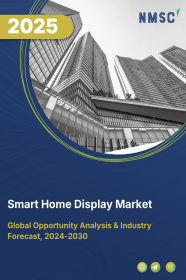
U.S. Smart Display Market by Display Technology (LCD, LED, E-Paper Display, and Other Display Technologies), by Type (Standalone Smart Displays, Integrated Smart Displays, Interactive Touchscreen Displays, Transparent Smart Displays, and Other Display Types), by Display Size (Below 24 Inch, 24 Inch to 55 Inch, and Above 55 Inch), by Resolution (UHD, FHD, HD, and Others) and Others– Opportunity Analysis and Industry Forecast, 2023–2030
Industry: Semiconductor & Electronics | Publish Date: 15-Feb-2025 | No of Pages: 81 | No. of Tables: 63 | No. of Figures: 26 | Format: PDF | Report Code : SE1009
Market Definition
U.S. Smart Display Market was valued at USD 1.30 billion in 2022, and is predicted to reach USD 5.78 billion by 2030, with a CAGR of 18.9% from 2023 to 2030. A smart display is a technologically advanced device equipped with a touchscreen or interactive visual interface, integrated with voice recognition and artificial intelligence capabilities.
These displays serve as information hubs that can perform a variety of functions, including displaying information, controlling smart home devices. It provides visual responses to voice commands, enabling video calls, and serving as interactive tools for tasks such as scheduling, weather updates, and entertainment.
Smart displays are designed to enhance convenience, accessibility, and user interactivity in various contexts, such as homes, offices, and public spaces. These displays are utilized in various settings, including residential homes, offices, healthcare facilities, retail, education, and more.
Fueling the Future: Digitalization and Energy Efficiency Drive the US Smart Display Market
The rapid expansion of digitalization and a dedicated commitment to Energy Efficiency Initiatives are propelling the smart display market in the United States. As consumers embrace smart home technologies to elevate convenience and control in their digitally connected daily lives, the demand for smart displays has witnessed remarkable growth.
These smart displays serve as central hubs for smart homes, providing an interactive and visually engaging interface for users to seamlessly manage a wide range of connected devices and services, making them a cornerstone of the evolving smart home ecosystem in the US.
Elevating Sustainability: Smart Displays Revolutionize Energy Efficiency in US Homes
The increasing focus on sustainability has played a pivotal role in driving the widespread adoption of smart home solutions, with smart displays at the forefront. These innovative devices empower homeowners to finely tune their energy consumption, leading to cost savings, by providing real-time information and control over smart thermostats, lighting, and appliances.
This alignment with the twin forces of digitalization and growing energy-consciousness has positioned smart displays as indispensable components within the evolving smart home ecosystem in the United States, bridging the gap between eco-friendly living and cutting-edge technology.
Security Vulnerabilities in Smart Home Displays Restrain Market Growth
Security vulnerabilities in smart display technology represent a significant restraining factor for the smart display market. The potential for security breaches in smart displays poses a substantial risk to users. Insufficient security measures, such as weak passwords and inadequate encryption, could lead to the exposure of sensitive data. Therefore, it is imperative for manufacturers to prioritize robust security features within smart displays, including strong authentication methods and prompt vulnerability patching through regular updates.
Introduction of Laser-Based Display Technology
Laser-based display technology is presenting substantial opportunities within the smart display market. Its exceptional brightness, color accuracy, long-lasting durability, and energy efficiency position it as a prime choice for diverse applications, spanning from home theaters to outdoor signage and augmented reality experiences. The extended lifespan and reliability of laser-based displays result in reduced maintenance costs and align with sustainability objectives.
As this technology becomes increasingly accessible and cost-effective, it is instigating innovation in the realm of smart displays, particularly in sectors where top-tier visual quality and energy conservation are paramount, thus broadening the market's potential for expansion
Competitive Landscape
The U.S. smart display industry includes several market players such as Samsung Electronics, Qisda Corporation (BenQ), LG Corporation, Sharp Corporation, Lenovo Group Limited, Alps Alpine Co., Ltd, Sony Corporation, Google, LLC., Leyard Optoelectronic Co., and Amazon.com, Inc.
Key Benefits
-
The U.S. smart display market report provides a quantitative analysis of the current market and estimations through 2023-2030 that assists in identifying the prevailing market opportunities to capitalize on.
-
The study comprises a deep dive analysis of the market trend including the current and future trends for depicting the prevalent investment pockets in the market.
-
The information related to key drivers, restraints, and opportunities and their impact on the market is provided in the report.
-
The competitive analysis of the market players along with their market share in the U.S. smart display market.
-
The SWOT analysis and Porter’s Five Forces model are elaborated in the study.
-
Value chain analysis in the market study provides a clear picture of the stakeholders’ roles.
U.S. Smart Display Market Key Segments
By Display Technology
-
LCD
-
LED
-
E-Paper Displays
-
Other Display Technologies
By Type
-
Standalone Smart Displays
-
Integrated Smart Displays
-
Interactive Touchscreen Displays
-
Transparent Smart Displays
-
Other Display Types
By Display Size
-
Below 24 inch
-
24 inch to 55 inch
-
Above 55 inch
By Resolution
-
UHD
-
FHD
-
HD
-
Others
By Sales Channel
-
Direct Sales
-
Retailers and Distributors
-
E-Commerce Or Online Sales
By Application
-
Smart Home
-
Digital Signage
-
Automotive
-
Healthcare
-
Other Applications
Key Market Players
-
Samsung Electronics
-
Qisda Corporation (BenQ)
-
LG Corporation
-
Sharp Corporation
-
Lenovo Group Limited
-
Alps Alpine Co., LTD
-
Sony Corporation
-
Google, LLC.
-
Leyard Optoelectronic Co
-
Amazon.com, Inc.
REPORT SCOPE AND SEGMENTATION:
|
Parameters |
Details |
|
Market Size in 2022 |
USD 1.30 Billion |
|
Revenue Forecast in 2030 |
USD 5.78 Billion |
|
Growth Rate |
CAGR of 18.9% from 2023 to 2030 |
|
Analysis Period |
2022–2030 |
|
Base Year Considered |
2022 |
|
Forecast Period |
2023–2030 |
|
Market Size Estimation |
Billion (USD) |
|
Growth Factors |
Emphasis on energy efficiency. Increasing focus on sustainability. |
|
Companies Profiled |
10 |
|
Market Share |
Available for 10 companies |
|
Customization Scope |
Free customization (equivalent up to 80 working hours of analysts) after purchase. Addition or alteration to country, regional, and segment scope. |
|
Pricing and Purchase Options |
Avail customized purchase options to meet your exact research needs. |

















 Speak to Our Analyst
Speak to Our Analyst



















